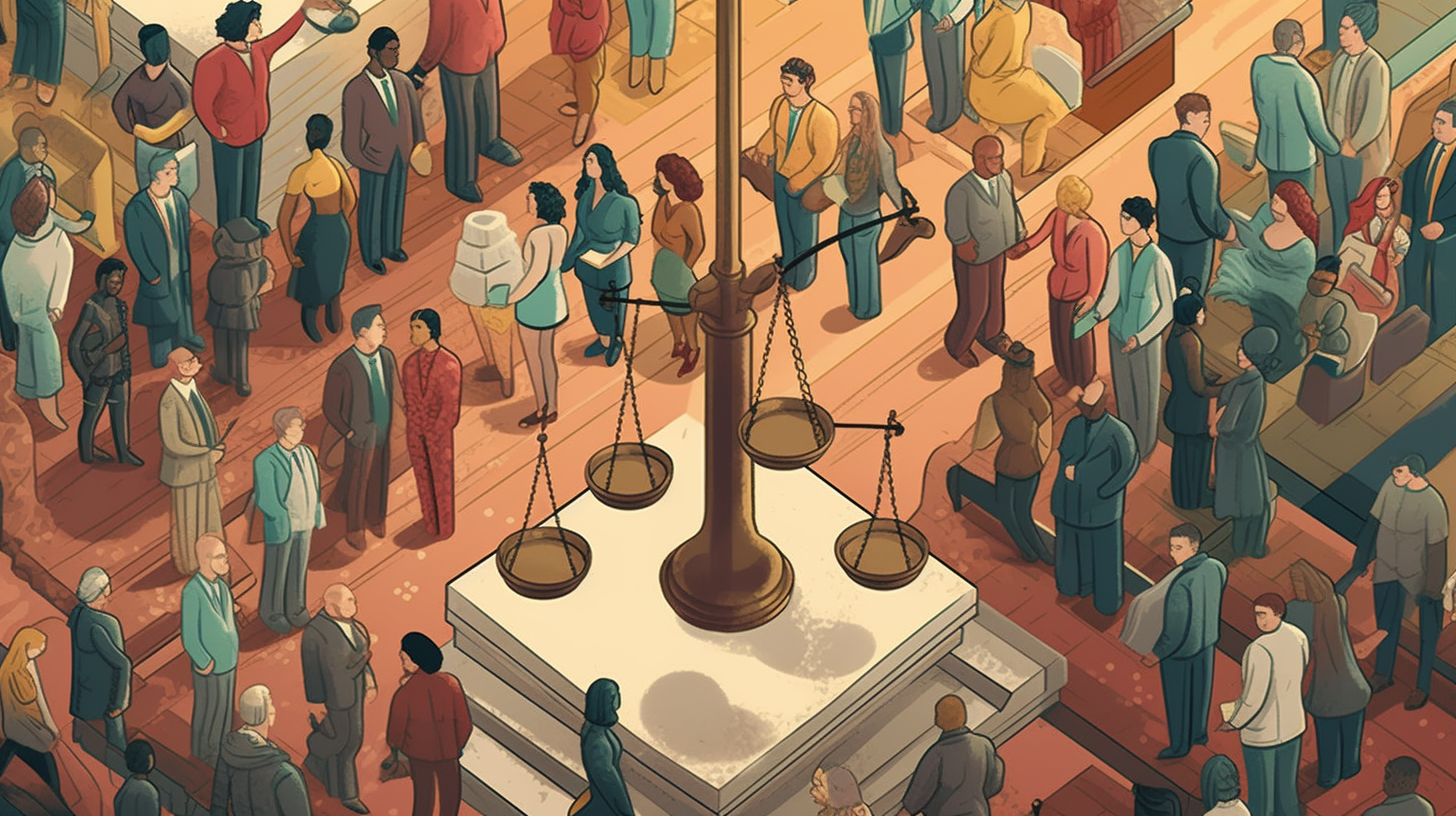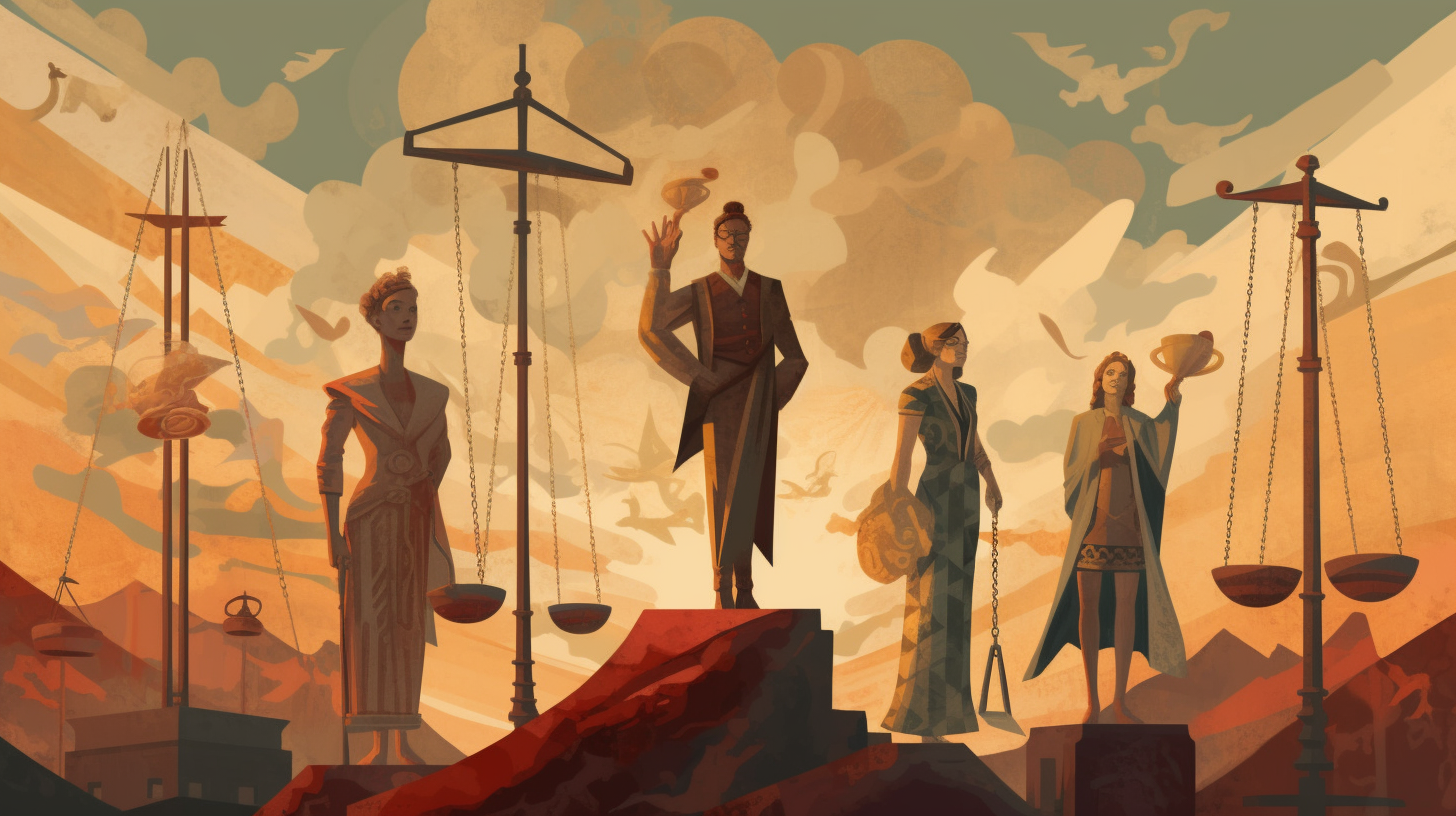The Ethics of Justice: Examining the Foundations of a Just Society
Justice has always been heralded in human civilization as the pinnacle of moral achievement. From ancient philosophers to modern political theorists, pursuing a just society has been a constant aspiration. However, amidst the grandeur of this ideal, it is crucial to dissect the foundations upon which justice claims to stand. In this critique, we shall challenge the conventional wisdom surrounding justice, employing historical references and sharp wit to unveil this noble pursuit's inherent contradictions and complexities.

The Elusive Nature of Justice:
Justice, in its essence, is a nebulous concept, perpetually eluding precise definition. It masquerades as objective truth, yet its interpretation varies significantly across cultures, epochs, and individuals. How can something so intangible serve as the moral compass for an entire society? This question challenges the notion of a universal and unchanging concept of justice.
Historical Failures and Misguided Assumptions:
To explore the ethics of justice, one must examine the historical failures that have plagued its implementation. Countless societies have claimed to be, yet the reality starkly contrasts their assertions. For example, the ancient Athenians hailed as champions of democracy practiced a brand of justice that excluded women, enslaved people, and foreigners from its lofty ideals. The injustices endured by marginalized populations highlight justice's flawed and selective nature.
Moreover, even within supposedly just societies, disparities and inequalities persist. The social stratification based on wealth, power, and privilege is an affront to any notion of fairness. As we peel back the layers of this supposed "just" society, we find that the concept itself is compromised by the structures it seeks to uphold.
Justice as a Tool of Power:
Power has always been intertwined with the pursuit of justice. Those who hold authority often use justice to their advantage, maintaining control and perpetuating their dominance. History brims with examples of rulers manipulating justice to serve their agendas, quashing dissent and consolidating their power.
Even in the modern era, the criminal justice system is tainted by biases, discrimination, and the crushing weight of institutionalized racism. The disproportionate incarceration rates of marginalized communities reveal the underlying flaws in our supposedly just societies. It seems justice has become a facade, a mask worn by those in power to maintain their grip on society.

The Ethical Dilemmas of Punishment:
A just society must grapple with the ethical dilemmas inherent in the notion of punishment. On the one hand, punishment is a deterrent, preventing individuals from engaging in harmful acts. On the other hand, punishment can be disciplinary, perpetuating a cycle of violence and dehumanization. Therefore, it is imperative to question the underlying assumptions that inform our approaches to punishment and ask ourselves whether they truly align with our aspirations for justice.
Furthermore, the concept of justice often falls prey to subjective notions of morality. Society's collective moral compass shifts over time, rendering previously accepted practices obsolete. Capital punishment, for example, was once viewed as a just form of retribution. However, it has come under scrutiny with evolving societal values and increasing awareness of human rights. Such shifts in moral perspectives necessitate constantly reevaluating what constitutes just punishment.

The examination of justice, far from being a mere intellectual exercise, reveals this elusive concept's inherent contradictions and complexities. As we peel back the layers of history, we find that justice has been wielded as a power tool, subject to biases and selective application. Pursuing a just society requires an unapologetic critique of conventional wisdom and a relentless commitment to challenging the status quo.
To truly forge a just society, we must acknowledge the shortcomings and limitations of justice itself. We must recognize the historical failures, the power dynamics, and the ethical dilemmas surrounding punishment. Only through such critical engagement can we hope to redefine justice and construct a society that embodies the values of fairness, equality, and compassion.
In this pursuit, we must embrace intellectual rigour, be unafraid to question deeply ingrained assumptions and challenge the illusions of justice. Let us not be content with platitudes and idealistic rhetoric but instead strive for a profound transformation of our understanding of justice and the ethical foundations upon which our societies are built.

Plato Re-Imagined
This course offers 32 comprehensive lectures exploring most of Plato's dialogues. These lectures guide students toward a consilient understanding of the divine—a concept that harmonizes knowledge across disciplines and resonates with secular and religious leaders. As a bonus, Lecture #33 focuses on consilience, demonstrating how different fields of knowledge can converge to form a unified understanding.






